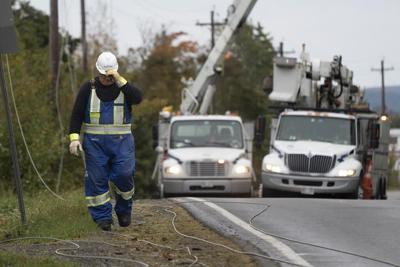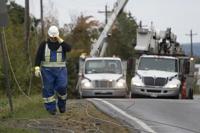HALIFAX - Eleven days after post-tropical storm Fiona yanked down power lines across Atlantic Canada, about 15,000 residents of P.E.I. and Nova Scotia were still in the dark Wednesday, many of them fuming about their fate.
In northern Nova Scotia, hundreds of angry residents sent messages to provincial politician Elizabeth Smith-McCrossin earlier this week when they learned their homes would not be reconnected with the electricity grid until Sunday — more than two weeks after Fiona's hurricane-force winds started lashing the East Coast.
"The people who are still without power are very distressed and exasperated," Smith-McCrossin said late Tuesday in an interview.
"We have many seniors and vulnerable people — persons with disabilities — who have no way of contacting people to let them know they need help and are without safe drinking water. It's a real health and safety issue now."
Without electricity, many homes and businesses in rural parts of Nova Scotia and P.E.I. have no access to running water because the pumps in their wells aren't working.
Smith-McCrossin, Independent member of the legislature for Cumberland North, said she recently submitted a list of names and addresses of vulnerable people to the military, which started wellness checks on Monday. But more needs to be done, she said.
"I received hundreds of messages last night, very angry people telling me, 'You have to do something,'" she said. "We need more help .... We need more boots on the ground."
Later on Wednesday, the Nova Scotia government asked for more support from the Canadian Armed Forces and declared a state of emergency across Cape Breton and in five counties across eastern and northern Nova Scotia.
More than 7,000 Nova Scotia homes and businesses were still without electricity as of Wednesday afternoon; another 8,900 were still in the dark in Prince Edward Island.
Heather Taves of Stratford, P.E.I., said her life has been reduced to dim drudgery since the lights went out on Sept. 24. "My day is … it's the search for water, it's the search for food … stay for an hour on the line with Maritime Electric," she said in an interview Wednesday.
Her routine also includes sleeping until the sun comes up — to save on batteries — making toast and coffee on the barbecue, checking on her older neighbours, charging her cellphone in her car and heading to the library in Charlottetown with her daughter.
"Then we eat one big meal somewhere in a restaurant during the day," the retiree said. "When it gets dark, we try to heat up some water and have some soup. We light candles and then we read by candlelight. We go to sleep very early because it's just boring and we're tired."
Taves, 62, said the storm has also frustrated her efforts to start a new business. "We are really struggling," she said. "We cry a couple of times a day. The neighbours say they cry a couple times a day, too."
In Bible Hill, N.S., Barry Haner recalled how the storm flooded his basement and soaked the electric pump he uses for his well. He's been hauling containers of water back and forth to his workplace every since. He said he has grown weary of being repeatedly told the electricity will soon return, only to be told there will be another delay.
On Tuesday, he was told the power would be back on by Saturday. That's when he called Nova Scotia Power Inc., the province's privately owned electric utility.
"I got an actual person," he said Wednesday. "I felt bad for that person. I started the conversation by saying, 'I apologize for the tone of my voice, but I am just beyond frustrated at this point.' She didn't take it personally. At the same time, I got no real answers."
Haner said that he moved his family to a larger home in Bible Hill 17 years ago partly because the residential village near Truro, N.S., had better services to offer, including what he thought was a more stable electricity grid. His family lost power for seven days after hurricane Juan ravaged the province in 2003. They didn't want to go through that again, he said.
"Just a little more salt in that wound," Haner said with a chuckle. "I have a positive attitude … (and) I know there's so many people who have it worse — with way more damage. And my heart goes out to those people. But at the same time, we live in Canada … and I live in an urban area."
In 2003, Juan knocked out power to 300,000 Nova Scotia homes and businesses. It took Nova Scotia Power 15 days to restore electricity to almost all of its customers. And in 2019, post-tropical storm Dorian left 411,000 customers in the dark. At the time, full restoration took about 10 days.
At the height of Fiona's fury, about 415,000 of Nova Scotia Power's 525,000 customers were without power.
"We have described Fiona as having the power of Juan and the size of Dorian," Nova Scotia Power spokeswoman Jacquelin Forster said in a statement. "
"The damage is widespread and extensive. There have been thousands of downed trees, hundreds of broken poles and washed-out roads across the province."
Earlier this week in Charlottetown, Josh Kilbride asked his son to close his eyes and make a wish for the power to come back on after a nine-day absence. As the seven-year-old stood on the stairs in his socks and PJs with his eyes closed, his father flicked a switch and lights came on.
"He thinks that he magically made the power come back on, so we kind of had some fun with it," Kilbride said. "He was so excited. It was the best part of the week, really. It was a good smile. It was priceless."
This report by Ďă¸ŰÁůşĎ˛ĘąŇĹĆ×ĘÁĎ was first published Oct. 5, 2022.








































